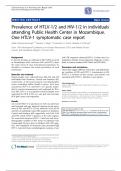Exam (elaborations)
Exam (elaborations) EU Internal Market Law - Free movement of services
- Module
- EU Internal Market Law
- Institution
- Queens University Belfast (QUB)
Exam of 5 pages for the course EU Internal Market Law at QUB (Problem Question)
[Show more]







